|

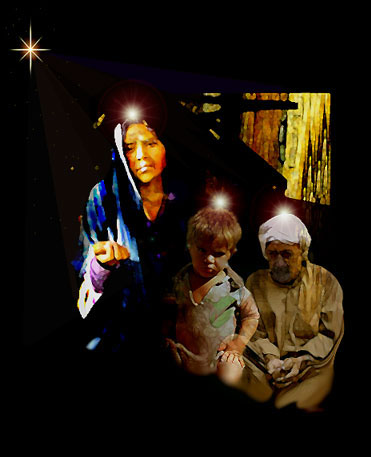
The Story of the Christmas Guest
Helen Steiner Rice
It happened one day at the year's white end,
Two neighbors called on an old-time friend
And they found his shop so meager and mean,
Made gay with a thousand boughs of green,
And Conrad was sitting with face a-shine
When he suddenly stopped as he stitched a twine
And said, "Old friends, at dawn today,
When the cock was crowing the night away,
The Lord appeared in a dream to me
And said, 'I am coming your guest to be'.
So I've been busy with feet astir,
Strewing my shop with branches of fir,
The table is spread and the kettle is shined
And over the rafters the holly is twined,
And now I will wait for my Lord to appear
And listen closely so I will hear
His step as He nears my humble place,
And I open the door and look in His face. . ."
So his friends went home and left Conrad alone,
For this was the happiest day he had known,
For, long since, his family had passed away
And Conrad has spent a sad Christmas Day.
But he knew with the Lord as his Christmas guest
This Christmas would be the dearest and best,
And he listened with only joy in his heart.
And with every sound he would rise with a start
And look for the Lord to be standing there
In answer to his earnest prayer
So he ran to the window after hearing a sound,
But all that he saw on the snow-covered ground
Was a shabby beggar whose shoes were torn
And all of his clothes were ragged and worn.
So Conrad was touched and went to the door
And he said, "Your feet must be frozen and sore,
And I have some shoes in my shop for you
And a coat that will keep you warmer, too."
So with grateful heart the man went away,
But as Conrad noticed the time of day
He wondered what made the dear Lord so late
And how much longer he'd have to wait,
When he heard a knock and ran to the door,
But it was only a stranger once more,
A bent, old crone with a shawl of black,
A bundle of faggots piled on her back.
She asked for only a place to rest,
But that was reserved for Conrad's Great Guest.
But her voice seemed to plead, "Don't send me away
Let me rest awhile on Christmas day."
So Conrad brewed her a steaming cup
And told her to sit at the table and sup.
But after she left he was filled with dismay
For he saw that the hours were passing away
And the Lord had not come as He said He would,
And Conrad felt sure he had misunderstood.
When out of the stillness he heard a cry,
"Please help me and tell me where am I."
So again he opened his friendly door
And stood disappointed as twice before,
It was only a child who had wandered away
And was lost from her family on Christmas Day. .
Again Conrad's heart was heavy and sad,
But he knew he should make this little child glad,
So he called her in and wiped her tears
And quieted her childish fears.
Then he led her back to her home once more
But as he entered his own darkened door,
He knew that the Lord was not coming today
For the hours of Christmas had passed away.
So he went to his room and knelt down to pray
And he said, "Dear Lord, why did you delay,
What kept You from coming to call on me,
For I wanted so much Your face to see. . ."
When soft in the silence a voice he heard,
"Lift up your head for I kept My word--
Three times My shadow crossed your floor--
Three times I came to your lonely door--
For I was the beggar with bruised, cold feet,
I was the woman you gave to eat,
And I was the child on the homeless street."
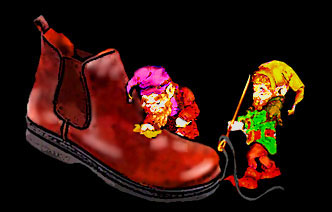
The Elves & The Shoemaker
by the brothers Grimm
Once upon a time there was a poor shoemaker. He made excellent shoes and worked quite diligently, but even so he could not earn enough to support himself and his family. He became so poor that he he could not even afford to buy the leather he needed to make shoes; finally he had only enough to make one last pair. He cut them out with great care and put the pieces on his workbench, so that he could sew them together the following morning.qfof
"Now I wonder," he sighed, "will I ever make another pair of shoes? Once I've sold this pair, I shall need all the money to buy food for my family. I will not be able to buy any new leather.
That night, the shoemaker went to bed a sad and distraught man.
The next morning, he awoke early and went down to his workshop. On his bench he found an exquisite pair of shoes! They had small and even stitches, formed so perfectly that he knew he couldn't have produced a better pair himself. Upon close examination, the shoes proved to be from the very pieces of leather he had set out the night before. He immediately put the fine pair of shoes in the window of his shop and drew back the blinds.
"Who in the world could've done this great service for me?" he asked himself. Even before he could make up an answer, a rich man strode into his shop and bought the shoes-- and for a fancy price.
The shoemaker was ecstatic; he immediately went out and purchased plenty of food for his family--and some more leather. That afternoon he cut out two pairs of shoes and, just as before, laid all the pieces on the bench so that he could sew them the next day. Then he went upstairs to enjoy the good meal with his family.
"My goodness!" he cried the next morning when he found two pairs of beautifully finished shoes on his workbench. "Who could make such fine shoes--and so quickly?" He put them in his shop window, and before long some wealthy people came in and paid a great deal of money for them. The happy shoemaker went right out and bought even more leather.
For weeks, and then months, this continued. Whether the shoemaker cut two pairs or four pairs, the fine new shoes were always ready in the morning. Soon his small shop was crowded with customers. He cut out many types of shoes: stiff boots lined with fur, delicate slippers for dancers, walking shoes for ladies, tiny shoes for children. Soon his shoes had bows and laces and buckles of fine silver. The little shop prospered as never before, and it's proprietor was soon a rich man himself. His family wanted for nothing.
As the shoemaker and his wife sat by the fire one night, he said, "One of these days, I shall have to learn who has been helping us."
"We could hide behind the cupboard in your workroom," she said. "That way, we could find out just who your helpers are." And that was just what they did. That evening, when the clock struck twelve, the shoemaker and his wife heard a noise. Two tiny men, each with a bag of tools, were squeezing beneath a crack under the door. Oddest of all the two elves were stark naked!
The two men clambered onto the workbench and began working. Their little hands stitched and their little hammers tapped ceaselessly the whole night through.
"They are so small! And they make such beautiful shoes in no time at all!" the shoemaker whispered to his wife as the dawn rose. (Indeed the elves were about the size of his own needles.)
"Quiet!" his wife answered. "See how they are cleaning up now." And in an instant the two elves has disappeared beneath the door.
The next day, the shoemaker's wife said, "Those little elves have done so much good for us. Since it is nearly Christmas, we should make some gifts for them."
"Yes!" cried the shoemaker. "I'll make some boots that will fit them, and you make some clothes." They worked until dawn. On Christmas Eve the presents were laid out upon the workbench: two tiny jackets, two pairs of trousers, and two little woolen caps. They also left out a plate of good things to eat and drink. Then they hid once again behind the cupboard and waited to see what would happen.
Just as before, the elves appeared at the stroke of midnight. They jumped onto the bench to begin their work, but when they saw all the presents they began to laugh and shout with joy. They tried on all the clothes, then helped themselves to the food and drink. Then they jumped down and danced excitedly around the workroom, and disappeared beneath the door.
After Christmas, the shoemaker cut out his leather as he always had--but the two elves never returned. "I believe they have heard us whispering," his wife said. "Elves are so very shy when it comes to people, you know."
"I know I will miss their help," the shoemaker said, "but we will manage. The shop is always so busy now. But my stitches will never be as tight and small as theirs!"
The shoemaker did indeed continue to prosper, but he and his family always remembered the good elves who had helped them during the hard times. And each and every Christmas Eve from that year onward, they gathered around the fire to drink a toast to their tiny friends.
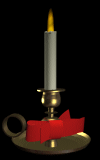
The Noel Candle
by Clement C. Moore
It was Christmas Eve in Rheims, France, nearly five hundred years ago. The spires of the great cathedral towered high in the sky over a throng of people who had gathered in a square before the church, celebrating the joyous Noel. Laughing children darted through the crowd as groups of youths and maidens sang carols and danced to the music of a lute and tambourine. Everywhere faces shone with such happiness, it did not seem possible there could be, in all of Rheims, one sad and lonely heart.
Yet there were four. Three of them lived in a squalid old shed by the river. Though its outward appearance was dismal, the inside was neat and clean. Its one room served as living room, dining room, bedroom and kitchen for three people, but the rough stone floor was carefully swept, and the patched covers on the straw mattresses in the corner were spotlessly clean. A rough table, broken chair, stool and rickety bench were the only furniture in the room. In a far corner stood a small charcoal brazier whose weak flame served not only to cook the meals but to warm the hut.
The one touch of beauty in the little room was supplied by a tiny shrine, built on a shelf at the rear wall. A few field flowers in a bowl stood in front of it, and from the shelf hung a heavily embroidered scarlet sash which had once held a knights' shield.
A young woman was bending over a small spinning wheel, a boy of seven was setting the table with their few cracked dishes, and a girl a year or so older was stirring a kettle over the brazier. The lady, whose beauty shone through in spite of her ragged clothing, was Madame la Contesse Marie de Malincourt, and the boy and girl, her son and daughter, Louis and Jeanne.
As she worked, the lady was thinking sadly of Christmas only a year before, when everything had been so different. Then she had lived in a great castle, and as on every Christmas Eve, she and her husband and children had gone down to the castle gate to greet the crowd assembled. The old, the ailing, and the poor would gather there, and the Malincourts would go into the crowd giving to each villager gifts of warm clothing, healing herbs and food. Even Louis and Jeanne would give something from their own toys to the village children.
Then war had swept over their happy valley; the castle had been attacked and robbed. Lady Marie's husband had been led away in chains while she and the children had fled down a secret passageway out in the night and away to the village. She found it deserted, the villagers frightened away by the attackers.
During the months that followed, the three had wandered along the highway trading away their belongings bit by bit in return for food and lodging. Even Lady Mari's coat had gone to the wife of a rich merchant, and the pretty clothing of Louis and Jeanne had been replaced by coarse peasant wear. Only one thing remained of their belongings - the cover of her husband's shield, which little Louis had brought from the castle that dreadful night. "Father gave it to me to keep until he comes back," he said and through all the terrors of their flight he had clung to it. It was dear to all of them, for it was their only reminder of their father and the life they had shared together.
"Mother," said Jeanne suddenly, interrupting her mother's thoughts, "it is Christmas tonight."
"Yes, sighed Lady Maire, "but there will be no toys or sweets for you and little Louis the Noel."
"We don't need them," the children answered. "We have you, Mother, and we can keep Christmas in our heart.
Their mother looked up at them and smiled. "Yes, though life is hard," she said, "we still have each other, and even though we miss your father, I'm sure there are others in Rheims tonight that miss their lived ones also. I just wish we had something to give the poor as we once did..." A thoughtful silence filled the room.
"Mother," Jeanne said excitedly, "I know something we can give." As she talked she picked up the small tallow candle from the table and hurried to one window of the hut.
"See," she went on, "I will put it on the sill and perhaps someone who passes, someone like ourselves, will be happier because of this little gift of light. There - see how it shines out on the snow," and she stood back to survey her work.
"You are a good child, Jeanne," said Lady Marie, then smiling gently, she resumed her work.
Down in the great square, among all the lights and gaiety, was another sad heart. It beat in the breast of a little lad of nine, a boy in ragged clothes whose bare feet were thrust into clumsy wooden clogs. He was utterly alone in the world, without money or friends, cold hungry and miserable. When he tried to tell his story to some of the milling people around him, no one took any interest in him, other than to frown at him or elbow him out of the way.
At last, in utter despair, he began to tramp the streets, stopping now and then to gaze at the splendid houses and to seek help. But there was no welcome in any of them for the poor lonely child.
It was dark in the streets of Rheims now, and the air was growing colder, but the little child trampled on, trying desperately to find shelter before the night closed in. At last, far off down by the river, he saw a tiny gleam of light appear suddenly at a window and he hurried toward it. As he neared it, the boy saw it was only a small tallow candle at the window of a hovel, the poorest hut in all Rheims, but the steady light brought a sudden glow to his heart and he ran forward and knocked at the door.
It was quickly opened by a little girl, and at once two other people had risen to greet him. In another moment he found himself seated on a stool beside the charcoal brazier. The little girl was warming one of his cold hands in her palms, while her brother was holding the other, and a beautiful woman, kneeling at his feet, drew off the wooden shoes and rubbed his icy feet. When he was thoroughly warmed, the little girl dished up into three bowls and a cracked cup the stew which had been simmering on the fire. There was only a little of it, but she passed the fullest bowl to the stranger.
After a word of blessing, they ate their stew, and never had the thick soup tasted so rich and so satisfying. As they finished, a sudden flowing light filled the room, greater than the brightness of a thousand candles. There was a sound of angel voices, and the stranger had grown so radiant they could hardly bear to look at him.
"Thou, with thy little candle, have lighted the Christ child on his way to Heaven," said their guest, his hand on the door latch. "This night your dearest prayer shall be answered," and in another instant he was gone.
The countess and her children fell to their knees and prayed, and there they still were many minutes later when a knight in armor gently pushed open the door and entered the hut.
"Mari! Jeanne! Louis!" he cried in a voice of love. "Don't you know me after all these weary months of prison and barrel? How I have searched for you!"
Immediately his family clustered around him with embraces and kisses.
"But, Father, how did you find us here?" cried little Louis at last.
"A ragged lad I met on the highway told me where you live," answered the knight.
"The Christ child," said Marie reverently, and told him the story.
And so, forever after, they and all their descendants, have burned a candle in the window on the eve of Noel, to light the solitary Christ child on his way.
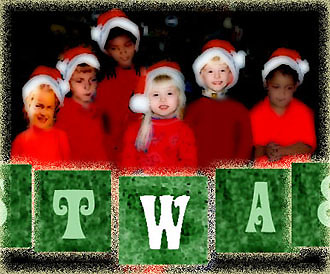
The "W" in Christmas
The story "The W in Christmas", originally titled "Christmas Love", was written and copyrighted by Candy Chand, author of several published inspirational works.
(It is available as a small, single-story, hard-back gift book at stores across the USA and at Amazon.com online)
Each December, I vowed to make Christmas a calm and peaceful experience. I had cut back on nonessential obligations - extensive card writing, endless baking, decorating, and even overspending. Yet still, I found myself exhausted, unable to appreciate the precious family moments, and of course, the true meaning of Christmas.
My son, Nicholas, was in kindergarten that year. It was an exciting season for a six year old. For weeks, he'd been memorizing songs for his school's "Winter Pageant." I didn't have the heart to tell him I'd be working the night of the production. Unwilling to miss his shining moment, I spoke with his teacher. She assured me there'd be a dress rehearsal the morning of the presentation. All parents unable to attend that evening were welcome to come then. Fortunately, Nicholas seemed happy with the compromise.
So, the morning of the dress rehearsal, I filed in ten minutes early, found a spot on the cafeteria floor and sat down. Around the room, I saw several other parents quietly scampering to their seats. As I waited, the students were led into the room. Each class, accompanied by their teacher, sat cross-legged on the floor. Then, each group, one by one, rose to perform their song.
Because the public school system had long stopped referring to the holiday as "Christmas," I didn't expect anything other than fun, commercial entertainment - songs of reindeer, Santa Claus, snowflakes and good cheer. So, when my son's class rose to sing, "Christmas Love," I was slightly taken aback by its bold title. Nicholas was aglow, as were all of his classmates, adorned in fuzzy mittens, red sweaters, and bright snowcaps upon their heads. Those in the front row- center stage - held up large letters, one by one, to spell out the title of the song. As the class would sing "C is for Christmas," a child would hold up the letter C. Then, "H is for Happy," and on and on, until each child holding up his portion had presented the complete message, "Christmas Love."
The performance was going smoothly, until suddenly, we noticed her; a small, quiet, girl in the front row holding the letter "M" upside down - totally unaware her letter "M" appeared as a "W". The audience of 1st through 6th graders snickered at this little one's mistake. But she had no idea they were laughing at her, so she stood tall, proudly holding her "W". Although many teachers tried to shush the children, the laughter continued until the last letter was raised, and we all saw it together. A hush came over the audience and eyes began to widen.
In that instant, we understood the reason we were there, why we celebrated the holiday in the first place, why even in the chaos, there was a purpose for our festivities. For when the last letter was held high, the message read loud and clear: "CHRISTWAS LOVE" And, I believe, He still is.
 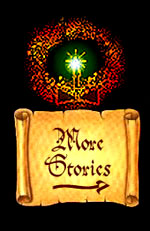 
|